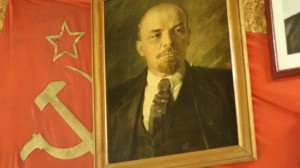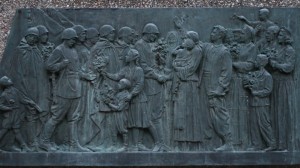
Despite Lithuania's 2008 ban on publicly displaying Soviet images, memorabilia from the defunct communist empire is readily accessible at souvenir markets and museums. Photo by Nathan Greenhalgh.
VILNIUS — The first reading of a bill that would criminalize denying or justifying Soviet or Nazi atrocities was approved by Lithuania’s parliament yesterday and will go to committee.
On December 10 the Seimas national defense and human rights committees will discuss creating a bill that would add the denial or justification of the genocide and war crimes committed by the U.S.S.R. and Nazi Germany to Lithuania’s criminal code. The punishment would be a fine, arrest or imprisonment up to two years. The first reading passed with 41 in support, 13 against and 25 abstaining.
“It’s just the first step today. It’s far from adoption,” Jolanta Anskaitienė, chief specialist of the Seimas publication department, told Baltic Reports. “Maybe there will be some amendments.”
Similar bills have been proposed in the Seimas before but were defeated by the previous Social Democratic ruling coalition. The left wing made up the bill’s 13 opponents at yesterday’s vote.
One of this incarnation’s sponsors, Homeland Union-Lithuanian Christian Democrat party member Vilija Aleknaitė-Abramkienė said the bill was needed to bring Lithuania in line with European Union directives on hate speech. The EU gives each member state the option to enact a maximum term of three years imprisonment for “denying or grossly trivializing crimes of genocide, crimes against humanity and war crimes.”

Aleknaitė-Abramkienė told Baltic Reports the bill would fight historical revisionism of Soviet rule. Russia argues that the Baltic states voluntarily joined the U.S.S.R. and were not illegally occupied. This Soviet-era relief at Lithuania's Grūtas Park museum portrays the Russian view that the Red Army liberated, not occupied Lithuania. Photo by Nathan Greenhalgh.
“We will criminalize justification of the Holocaust and other crimes made by totalitarian regimes and I think we have no choice, it is our duty,” Aleknaitė-Abramkienė told Baltic Reports. “It would be very good if Russia would do the same.”
Aleknaitė-Abramkienė said she was confident President Dalia Grybauskaitė would sign the bill if it reached her desk.
“I think if it will go through Seimas, definitely, because it’s very logical to sign it because it reflects common direction with the European Union,” Aleknaitė-Abramkienė told Baltic Reports.
In 2008 Lithuania banned the public display of Soviet and Nazi symbols. The move was decried by the Russian Foreign Ministry, which mentioned the Soviet Union’s role in helping the Allies defeat Nazi Germany in WWII.












